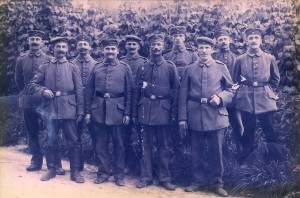In Josh Lambert’s Tablet Books Column, A Familiar Name
If you follow this blog, it’s likely not news to you that one of my most trusted resources for information on new Jewish books is Josh Lambert’s column on Tablet. But I found something especially newsworthy in this week’s column: a mention of William C. Donahue‘s Holocaust as Fiction: Bernhard Schlink’s Nazi Novels and Their Films (Palgrave).
To explain why this discovery resonated so strongly, I must backtrack.
Almost eighteen years ago, when I was entering a Ph.D. program in Modern French history, I found myself in an intensive summer school class, trying to acquire sufficient skills to pass the German portion of my department’s language requirements. Yes, I was focusing on France, but the department required me, as a Europeanist, to demonstrate sufficient reading knowledge of both French and German.
Never mind that my paternal grandparents had been born and raised in Germany. Never mind that my father grew up speaking German at home–his grandmother, who joined the family in New York in 1946, never really learned to speak English. Never mind that, at times throughout my childhood, my father and his parents would switch to German when they wanted to communicate something they did not want my sister or me to understand. I hadn’t learned German. I hadn’t wanted to learn it. But that summer of 1993, I didn’t have a choice any longer. And William C. Donahue (Bill), then pursuing his own doctoral studies, was my instructor.
Bill was an excellent teacher (as was the other then-graduate student, Joe Metz, who worked with our group in additional drill sessions). And although, as his new book’s title suggests, his primary scholarly interests rested in German literature, Bill was very conscious of and sensitive to pedagogical issues—including the issue of how Nazism and the Holocaust were taught and represented in elementary German-language instruction.
Ultimately, Bill wrote (and won an award for) an article titled “‘We shall not speak of it’: Nazism and the Holocaust in the Elementary German Course.” I am proud that one of the appendices to this article comprises questions that I conveyed that summer from my classmates to my grandparents during a weekend visit, and my grandparents’ responses. (If you click the link above, you’ll see only the first page of the article. Bill mentions the interview there, but you’ll need full access via a participating library or publisher to see the article and interview in their entirety.)
One word that I learned that summer working with Bill and Joe appears more than once in what is the effective title story of my forthcoming collection, Quiet Americans. It’s a word that resonated strongly when I learned it, and, evidently, it stayed with me long past the time when most of the others that I’d learned that summer had, frankly, disappeared from my memory.
It’s Vergangenheitsbewältigung.
As the story’s narrator explains, “It’s a word that means, roughly, ‘coming to terms with the past.'”
Bill Donahue has helped me–and, I am sure, many others–with that process of coming to terms with the past. I look forward to reading his new book.
Oh, and by the way: Bill (and Joe) also helped me pass my department’s German exam that long-ago fall.
